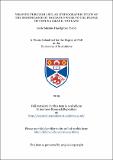Weaving through life : an ethnographic study of the significance of pandanus work to the people of Futuna Island, Vanuatu
Abstract
This thesis investigates how workers of pandanus on Futuna Island engage with and navigate the world around them through their work. Pandanus work is integral to social life: it nurtures, sustains, creates meaning and relations. Through focusing on the handicraft and considering pandanus work as a process: from the upkeep of the plants and the treatment of the leaf materials, the creation of structured artefacts and decorative plaited patterns, to the exchange and sale of baskets and mats and the final discarding of the artefacts, the research explores the complex set of meanings, sensibilities and challenges inherent in this multi-faceted and productive activity.
The ethnographic study fills an important gap in current research by exploring the pandanus baskets and mats used in the everyday rather than the artefacts of ceremonial importance. The quotidian interests and concerns of people in Vanuatu and how these are expressed through activities and material forms creates the very fabric of the thesis and reveals what is important in life on Futuna.
The study is set in a context where local knowledge and ways of doing things are actively reflected on and discussed as people navigate conflicting ideologies and ways of being. I argue that pandanus work is fundamentally a process of production where not only artefacts, but knowledge, subjects and relationships are created, nurtured and developed. Fundamental ideas about life are questioned in processes of pandanus work.
Thus through considering the social, religious, and environmental aspects of pandanus work, the research furthers anthropological understandings of how ideas, beliefs and challenges are explored and explained in the quotidian production and use of plaited mats and baskets in Vanuatu. This project explores how women on Futuna figuratively weave the story of their lives.
Type
Thesis, PhD Doctor of Philosophy
Collections
Items in the St Andrews Research Repository are protected by copyright, with all rights reserved, unless otherwise indicated.

